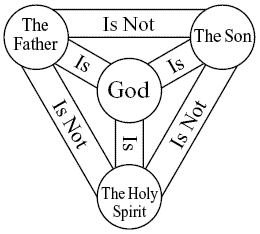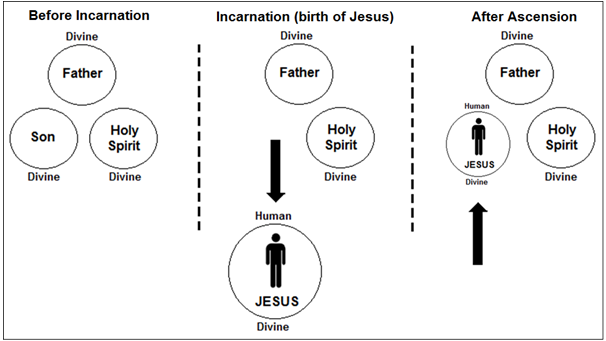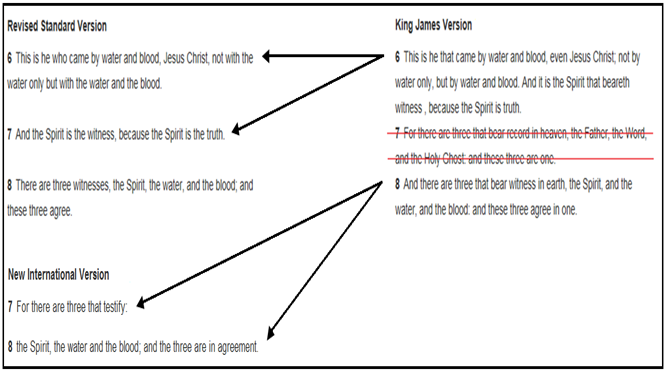




-
 Ten Ways the Bible Disproves the Trinity.
Ten Ways the Bible Disproves the Trinity.
Ten Ways the Bible Disproves the Trinity.
by Many Prophets One Message
on December 1, 2014
 The doctrine of the Trinity defines God as one being who eternally exists as three distinct Persons — the Father, Son and Holy Spirit. Put simply, “one God in three persons”. Each of these persons has their own will, personality and they each perform different roles. While distinct from one another in these regards, in all else they are stated to be co-equal, and “each is God, whole and entire”. This is a typical diagram used by Trinitarians to summarise the doctrine of the Trinity:
The doctrine of the Trinity defines God as one being who eternally exists as three distinct Persons — the Father, Son and Holy Spirit. Put simply, “one God in three persons”. Each of these persons has their own will, personality and they each perform different roles. While distinct from one another in these regards, in all else they are stated to be co-equal, and “each is God, whole and entire”. This is a typical diagram used by Trinitarians to summarise the doctrine of the Trinity:

Now, if the Trinity represents the truth about the nature of God Almighty, and was preached by Jesus (peace be upon him), then one would expect this to be reflected clearly throughout the Bible. Moreover, one would not expect to find anything which negates the doctrine. What follows are ten reasons, taken from the Bible, that disprove the doctrine of the Trinity.
1. God does not change.
A key element of the Trinity is the incarnation. This teaches that the second person of the Trinity, God the Son, took on human flesh in the bodily form of Jesus. Thus when Mary gave birth to Jesus, God entered into the creation as a human being:

However such beliefs contradict what the Bible teaches about God’s nature:
Your throne is established from of old; you are from everlasting. [Psalm 93:2]
Every good and perfect gift is from above, coming down from the Father of the heavenly lights, who does not change like shifting shadows. [James 1:17]
The Bible defines God’s nature as eternal and unchanging; indeed, God cannot change, because He transcends time. So the claim that God became flesh is a contradiction.
Trinitarians try to get around this problem by arguing that when God became man, a human nature was merely added to God’s existing divine nature. Since the two natures did not mix, the divine nature did not change at all and so God remained the same.
Can this be considered valid reasoning? Well, if God ‘added’ a new nature to Himself, then that is a change in state. Was God always a man? He was not. Did God become a man? According to Trinitarians, he did. So to claim that God did not change is nothing more than philosophical wordplay.
To illustrate this, let’s take the example of a man called John. Consider a situation where God grants John a divine nature. Even if John’s original nature, humanity, remains unchanged and separate from his divinity, would you ever conclude that John has not changed at all?
Would any reasonable person argue, “well, John hasn’t really changed in nature, his original finite human nature is only being complemented by an additional infinite nature”. To claim that John, going from mere mortal to master of the universe, has undergone no change would be absurd.
Clearly, John has changed from one state, not being God, to another, being God. This mirrors the Trinitarian claim that God became flesh, which also entails a change from one state, not being human, to another, being human. The end result for Jesus and John is the same; they’ve both become God-men.
We must conclude that the doctrine of the Trinity involves a change in the nature of God. This directly contradicts the Bible’s statements that God is eternal and unchanging.
-

2. It compromises God’s absolute perfection.
God is perfect in every way possible, both Muslims and Christians believe this to be true. However the claim that God became flesh poses a fundamental problem. Since God is the pinnacle of perfection, there is no need for Him to become anything. If something needs to be added to His nature, such as humanity or anything else for that matter, then doesn’t that mean He lacked something before? Which state is considered more “godly”, the pre-incarnation God, or post-incarnation God? You can see that the doctrine of the incarnation puts Trinitarians in a blasphemous predicament.
3. Jesus affirms the pure monotheism of the Old Testament.
There is an interesting incident according to the New Testament where a Jewish teacher of the law approaches Jesus and asks him which of the commandments is the most important:
“The most important one,” answered Jesus, “is this: ‘Hear, O Israel: The Lord our God, the Lord is one…”
“Well said, teacher,” the man replied. “You are right in saying that God is one and there is no other but him…”
When Jesus saw that he had answered wisely, he said to him, “You are not far from the kingdom of God…” [Mark 12:28-34]
This incident was the perfect opportunity for Jesus to correct Jewish misconceptions about God’s nature and give a Trinitarian understanding. As you can see the exact opposite is the case, by quoting the Old Testament commandment about God being One and agreeing with the Jewish teacher’s interpretation, Jesus is affirming a Jewish understanding of God that is purely monotheistic and rejects all notion of God being a Trinity. Not only is the Jewish teacher’s wisdom about God acknowledged, but Jesus goes so far as to complement him, saying that he is close to the kingdom of God.
From this example it’s clear that Jesus followed in the footsteps of the Prophets of the Old Testament such as Abraham and Moses. Their core message was simple: there is one God Who is unlike His creation and He alone deserves our worship. Does it make sense that God would send countless Prophets, over a span of thousands of years, with a consistent message of pure monotheism, only to all of a sudden reveal that He is a Trinity, a radically different message which contradicts His previous Prophets’ teachings?
How do Trinitarians explain this juxtaposition between their beliefs and the Old Testament? They claim that God reveals Himself gradually in stages; this is known as the concept of “Progressive Revelation”. This is the idea that the sections of the Bible that were written later contain a fuller revelation of God compared to the earlier sections. So the New Testament is to be used to better understand and interpret the Old Testament.
Such an explanation must be rejected because the progression from a purely monotheistic concept of God Who is unlike His creation, to the Trinity where God becomes His creation, is anything but gradual. Rather it is a radical overhaul of everything that came before it. Another problem with this explanation is that the Trinitarian concept of God’s nature is open to development. For example, when Trinitarians say that God exists as multiple persons, how do they know to stop at three? The word “Trinity” is nowhere to be found in the Bible, so why not four or five? At best they can say that only three persons have revealed themselves so far. But how do you know there isn’t a fourth waiting to reveal themself? Thus the Trinitarian can never lay claim to having an accurate understanding of God, because they can never be certain that God won’t reveal something in the future that radically overhauls their current understanding.
-

4. The Trinity is paradoxical.
The New Testament mentions an incident with Jesus and a fig tree:
Jesus was hungry. Seeing in the distance a fig tree in leaf, he went to find out if it had any fruit. When he reached it, he found nothing but leaves, because it was not the season for figs. Then he said to the tree, “May no one ever eat fruit from you again…” [Mark 11:12-14]
We are told that Jesus approached a fig tree because he was hungry, and became angry and cursed it when he realised it had no fruit. Such an incident makes no sense in light of the Trinitarian claim that Jesus is fully God. God is All Knowing, so if Jesus really is God then that would make him the creator of fig trees, in which case how could he not have known that it was not the season for figs? Moreover why would God curse the fig tree for producing fruit in certain seasons, something He Himself willed it to do? When it comes to the knowledge of Jesus it seems that either the divine nature is lacking or completely absent. How then can the claim be made that Jesus is fully God? From what we’ve seen it seems that Jesus is human but not divine because he lacks essential attributes of God, such as possessing All Knowledge.
Moreover such incidents bring to light the many paradoxes of the Trinity. For example, how can God be All Powerful and yet have weaknesses such as hunger? Such attributes are mutually exclusive. It would be like being asked to draw a square circle. Such a task is impossible, because a shape cannot have four corners like a square and no corners like a circle at the same time. Yet such paradoxes are what Trinitarians have to believe in order for Jesus to not only be God, All Powerful and All Knowing, but also human with limitations such as hunger and possessing limited knowledge. Something cannot be both infinite and finite at the same time, and to believe so is no different than believing in a squircle.
Moreover such divine shortcomings aren’t just restricted to Jesus. The Bible tells us that the Holy Spirit also lacks God’s perfect knowledge:
“But about that day or hour no one knows, not even the angels in heaven, nor the Son, but only the Father.” [Mark 13:32]
Here Jesus categorically states that no one, which includes himself and the Holy Spirit, knows the Hour, but only the Father. Since they both lack the Father’s knowledge, the Trinitarian claim that the Father, Son and Holy Spirit are equal is false. The co-equality of the persons is a central pillar, without which the foundation of the Trinity comes crashing down.
-

5. Not defined anywhere in the Bible.
The nature of God is undoubtedly the most fundamental aspect of a religion. Scripture should provide a clear picture of who our Creator is, otherwise how can we be expected to properly worship that which we don’t understand?
If God wanted humanity to believe in His Triune nature, then why isn’t it clearly and explicitly defined anywhere in Scripture? There is no statement to be found anywhere in the Bible where God is described as being three co-equal persons, Father Son and Holy Ghost. This is in spite of the fact that there were numerous opportunities that were presented to Jesus where he could have spelled this out in detail:
One of the teachers of the law came and heard them debating. Noticing that Jesus had given them a good answer, he asked him, “Of all the commandments, which is the most important?”
“The most important one,” answered Jesus, “is this: ‘Hear, O Israel: The Lord our God, the Lord is one. Love the Lord your God with all your heart and with all your soul and with all your mind and with all your strength.’ The second is this: ‘Love your neighbour as yourself.’ There is no commandment greater than these.”
“Well said, teacher,” the man replied. “You are right in saying that God is one and there is no other but him. To love him with all your heart, with all your understanding and with all your strength, and to love your neighbour as yourself is more important than all burnt offerings and sacrifices.” [Mark 12:29-33]
It’s important to note that the Jewish understanding of the commandments rejects all notions of God being a Trinity. So in the passages above, by simply repeating the commandment about God being One, Jesus is re-affirming the Jewish understanding of God’s nature and therefore rejecting the Trinitarian understanding. This was the perfect opportunity for Jesus to correct the Jew’s misconceptions about God and give him the Trinitarian understanding of God being three co-equal persons, Father Son and Holy Ghost. As we have seen the exact opposite is the case, his answers provides ammunition to use against the Trinity.
Because there is a lack of a clear, explicit statement in support of the Trinity, what we find is that in order to support the doctrine of the Trinity using the Bible, Trinitarians have to cobble together bits and pieces of unrelated scripture in order to try and form a picture of a Triune God. Is the Bible a book of guidance or a Da Vinci code?
-

6. Fabrications inserted into the Bible to support the doctrine.
Now, there is a single statement in some versions of the Bible that comes very close to the doctrine of the Trinity. This verse is known as the Johannine Comma:
“For there are three that bear record in heaven, the father, the word, and the Holy Ghost: and these three are one” [1 John 5:7]
This verse used to be in all Bibles; however the editors of the Revised Standard Version (RSV) and New International Version (NIV) have removed the verse (please click on picture to enlarge):

Notice how verse 7 in the RSV is different to verse 7 in the KJV. The RSV does not contain the mention of the Trinity. Also notice that verse 7 in the NIV is different to not only the KJV but also the RSV. The NIV also does not contain the mention of the Trinity. The RSV and NIV have had to split other verses into two parts in order to make up for the deletion of the Johannine Comma, this is so that the verse numbers across all three versions of the Bible line up the same.
The King James Version (KJV) has grave defects, and so these newer versions of the Bible (which are based on older and hence more reliable manuscripts) were produced. Here is the NIV footnote regarding this verse:
Late manuscripts of the Vulgate testify in heaven: the Father, the Word and the Holy Spirit, and these three are one. {8} And there are three that testify on earth: the (not found in any Greek manuscript before the sixteenth century)
In other words, it is a fabricated verse that was inserted into the New Testament over 1,500 years after Jesus. Trinitarians should reflect on this question: why is the only clear Scriptural evidence for their beliefs a fabrication? Clearly, it had to be forced into the Bible to lend support for the doctrine because it is unbiblical.
-

7. Trinitarian scholars manipulate the Bible to protect the doctrine.
Now this is eternal life: that they know you, the only true God, and Jesus Christ, whom you have sent. [John 17:3]
This statement in the Bible is devastating to the doctrine of the Trinity, as it clearly identifies God as the only true God to the exclusion of Jesus. Here Jesus defines his own position as the Messiah, distinct from the Godhead, which consists of the Father alone.
In fact so devastating is this statement, that major pro-Trinitarian scholars of the past have resorted to manipulating the Bible in order to protect the doctrine of the Trinity. We note the remarkable comment of the celebrated Church Father Augustine. Augustine of Hippo is viewed as one of the most important Church Fathers in Western Christianity. It was so difficult for Augustine to harmonise John 17:3 with the doctrine of the Trinity, that this immensely influential church leader actually restructured Jesus’ words to accommodate both the Father and Son in the Godhead. Augustine, in his “Homilies on John”, boldly asserts that John 17:3 means:
“This is eternal life, that they may know Thee and Jesus Christ, whom Thou hast sent, as the only true God.” [1]
This daring alteration of the Bible seriously distorts the original meaning of the words in order to include Jesus in the Godhead. Such forcing of the text merely exposes Augustine’s desperation to protect his creed in the Bible.
8. All persons of the Trinity are equal, but some are more equal than others.
Anyone who speaks a word against the Son of Man will be forgiven, but anyone who speaks against the Holy Spirit will not be forgiven, either in this age or in the age to come. [Matthew 12:32]
If the three persons of the Trinity are equal in importance and all are 100% God, then why is speaking a word of blasphemy against the Holy Spirit an unforgivable sin, while doing a similar act against the Son, Jesus, can be forgiven? Since only the Holy Spirit has the right to not be blasphemed against, it seems that some persons of the Trinity are more equal than others!
-

9. Jesus acknowledges that he has a God.
Jesus said, “Do not hold on to me, for I have not yet ascended to the Father. Go instead to my brothers and tell them, ‘I am ascending to my Father and your Father, to my God and your God.’” [John 20:17]
Trinitarians attempt to explain such statements away by saying that it was only the human side of Jesus being subservient to God, not his divine side. The problem is that later in the Bible, after Jesus has ascended and cast aside all human limitations, he is still saying “my God”:
I am coming soon. Hold on to what you have, so that no one will take your crown. The one who is victorious I will make a pillar in the temple of my God. Never again will they leave it. I will write on them the name of my God and the name of the city of my God, the new Jerusalem, which is coming down out of heaven from my God; and I will also write on them my new name. [Revelation 3:11-12]
So their explanation of the human side of Jesus doing the talking falls apart when he is still using the same language of subservience as he did whilst he was here on earth. Moreover Jesus surrenders his kingdom to God:
Then the end will come, when he hands over the kingdom to God the Father after he has destroyed all dominion, authority and power. For he must reign until he has put all his enemies under his feet. The last enemy to be destroyed is death. For he “has put everything under his feet.” Now when it says that “everything” has been put under him, it is clear that this does not include God himself, who put everything under Christ. When he has done this, then the Son himself will be made subject to him who put everything under him, so that God may be all in all. [1 Corinthians 15:24-28]
If Jesus is fully God, and an equal member of the Trinity, then why does Jesus give back his kingdom to God the Father when our world comes to an end? In addition, why is Jesus made subject to God after he has surrendered his kingdom over? Clearly, God is forever supreme over all, including Jesus.
10. God is above Jesus in hierarchy.
But I want you to realize that the head of every man is Christ, and the head of the woman is man,and the head of Christ is God. [1 Corinthians 11:3]
This statement was uttered after Jesus had ascended and cast aside his human limitations. If the Trinity is true, then surely Paul (the author of the above statement) would have uttered something along the lines of “man is the head of a woman, and God and Christ are the head of man” which would imply a horizontal relationship between the persons in the Trinity. Clearly, God is above Jesus in this hierarchy, implying no co-equality between them, and thus there is no Trinity.
References
1 – Homilies on John, tractate CV, chapter 17.
Thread Information
Users Browsing this Thread
There are currently 1 users browsing this thread. (0 members and 1 guests)
Similar Threads
-
By فداء الرسول in forum English Forum
Replies: 0
Last Post: 05-10-2013, 11:30 PM
-
By فداء الرسول in forum Following Up With New Muslims
Replies: 0
Last Post: 30-09-2013, 12:11 AM
-
By فداء الرسول in forum English Forum
Replies: 0
Last Post: 08-09-2013, 01:21 PM
-
By سعود العتيبي in forum منتديات الحاسب الألى وشبكة الإنترنت
Replies: 0
Last Post: 15-05-2010, 02:00 AM
-
By سعود العتيبي in forum منتديات الحاسب الألى وشبكة الإنترنت
Replies: 0
Last Post: 20-10-2009, 07:06 PM
Tags for this Thread
 Posting Permissions
Posting Permissions
- You may not post new threads
- You may not post replies
- You may not post attachments
- You may not edit your posts
-
Forum Rules

The doctrine of the Trinity defines God as one being who eternally exists as three distinct Persons — the Father, Son and Holy Spirit. Put simply, “one God in three persons”. Each of these persons has their own will, personality and they each perform different roles. While distinct from one another in these regards, in all else they are stated to be co-equal, and “each is God, whole and entire”. This is a typical diagram used by Trinitarians to summarise the doctrine of the Trinity:











 Reply With Quote
Reply With Quote



Bookmarks